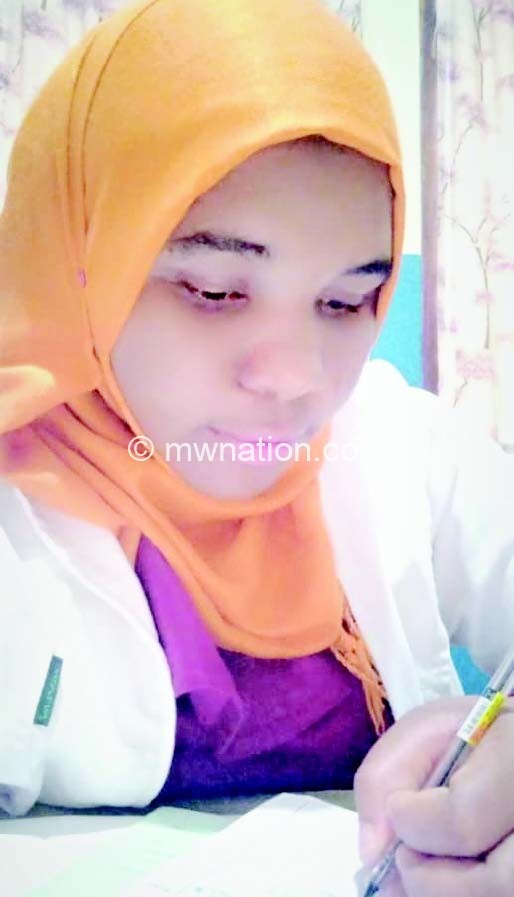Aisha Katita: Became doctor to beat the odds
Doctor Aisha Katita, Balaka District Hospital medical officer has experienced the all too familiar challenges most girls face in life to be where she is today.
Speaking recently when she was one of the young women invited for a role modelling session at Ulongwe in Balaka, Aisha did not mince words, but describe her background as a tear-jerking experience because of the poverty she had to endure.

The Ulongwe session was organised by Oxfam Malawi and Centre for Alternatives Victimised Women and Children (Cavwoc) as part of the commemoration of the International Day of the Girl Child.
“I come from a poor family of nine children and I am the last born. All we knew was subsistence farming and my father could not afford some of the most basic needs in life.
“I, however, realised earlier in life that I was disadvantaged and the only way out was to work hard in school to evade condemning my family to perpetual destitution. I pushed way above my weight to surpass in education so that I could lift myself out of the poverty circle,” Aisha said.
She said coming from the Yao tribe where stereotypes, culture and traditions condemn girls to early marriages and confine them to the kitchen, she had to work harder to prove people wrong.
Coming from Nkundi Village in Traditional Authority (T/A) Chilipa, Mangochi which is a predominantly Yao area populated by Muslims, Aisha had no role model to motivate her to excel and dream big in life.
However, it was the standard of life she was living at the village which made her resolute to succeed at all cost in to save her family from the indescribable poverty.
“I went to Nkundi and Mphika schools in Chilipa and Chikamveka Primary in Zomba before being selected to Aslaam Girls’ in [2005-2009].
“I then proceeded to the International University of Africa [2009-2016] in Sudan where I studied Bachelor of Medicine and Bachelor of Surgery [MBBS]. I came back to Malawi and did my residency [internship] at Queen Elizabeth Central Hospital [Quech] before being posted to Balaka District Hospital in 2018 where I am currently the district medical officer,” she said.
She said although she was walking long distances to school and met several challenges such as poverty, sexual advances from men and a chauvinistic culture that look down upon girls, she persisted because she wanted to break down the chain of cultural prejudice.
“I wanted to do something challenging and extraordinary in life to inspire girls back at home so that they can dream big. One of the most important challenges facing contemporary girls is that of marauding men and boys who coax them into early sexual relationships that often ends in early marriages and or teen pregnancies,” Aisha said.
The doctor plans to specialise in obstetrics and gynecology more specifically because most Yao women are not comfortable to be assisted by male gynecologists.
She said the Yao culture is overwhelmed with stereotypes and misconceptions that the only option available for girls is to get married early and advised the girls not to succumb to sexual advances from men, but work hard in school.
Oxfam Malawi’s Global Affairs of Canada-funded ‘Her Future Her Choice’ project coordinator Thandizo Mungwira said chitomelo and early sexual encounters are as some of the challenges girls face in their pursuit of education in culturally sensitive areas.
“In some areas, culture and traditional customs play an important role in discouraging girls’ education. The girls cannot concentrate on education and end up dropping out of school, getting married early and eventually becoming pregnant.
“We believe role models who have made it in life can influence some mindset change for girls and parents on the importance of continuing with education,” Mungwira said.
Cavwoc project coordinator Khumbolane Nyirenda said as a co-implementing partner for ‘Her Future Her Choice’ project, role-modelling sessions could help young girls to have someone they can look up to for inspiration and motivation to keep pushing in their education pursuit, especially in the Yao Culture.
“Most of the early marriages happen in rural areas where only 28 out of 100 girls finish the full eight years of primary education unlike in the urban areas. Without role-models to influence them, they can lose direction and end up getting married young,” Nyirenda said.
United Nations International Children’s Emergency Fund (Unicef) in 2017 said Malawi has one of the highest rates of child marriages in the world.
It ranked Malawi 13th highest in the world, with nearly one in two girls married before the age of 18.
Approximately 50 percent of girls in Malawi are married before the age of 18, a situation said to be fueled by prevailing socio-cultural factors and a legal as well as policy environment that puts girls to child marriages.





